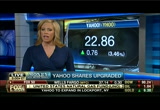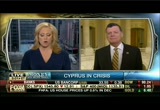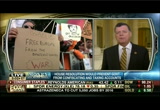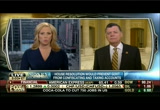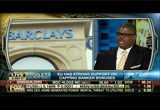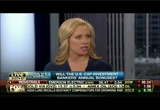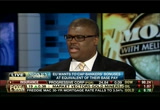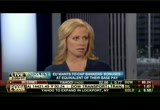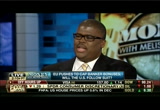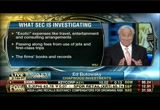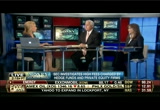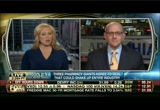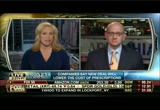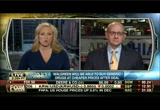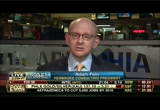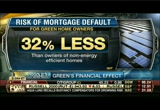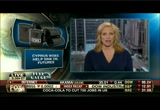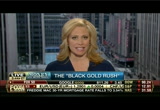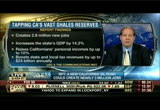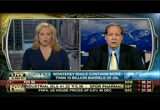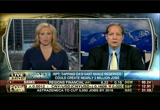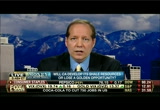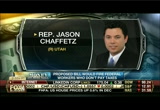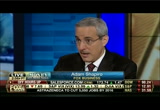tv MONEY With Melissa Francis FOX Business March 21, 2013 5:00pm-6:00pm EDT
5:00 pm
what i'm really looking for is -- i got two words for you -- re-wds. ♪ there's got to be better cards than this. [ male announcer ] there's a better way with creditcards.com. compare hundreds of cards from all the major banks to find the one that's right for you. it's simple. search, compare, and apply at crediards.com. first round's on me.
5:01 pm
sandra: let's go off the desk to canada. two entrepreneurs have a take on brushing the teeth without actually toothbrush. this is tnt. tongue to teeth. al loss you to brush your teeth by licking them. it aplouse you to remove plaque. adam: i'm glad you pointed that out. top two things to watch tomorrow. tiffany reported earnings after the bell. revenue of 1.25 billion. sandra: the number one thing to watch tomorrow will be cyprus. the european central bank
5:02 pm
says it will cut off emergency funding to cyprus banks if a bailout deal is not reached by monday. cyprus has said it will present an alternative proposal, adam, tomorrow. so, definitely will be watching that, that could be market moving. adam: right now we'll watch "money" with melissa francis. that's next. melissa: i'm melissa francis and here's who made mooney today. investors in hewlett-packard, their quarterly dividend jumping by 10%. the stock closed down today but investors have reason to smile. shares are still up about 56% this year. also making money, yahoo! getting another boost under marisa mayer's leadership. upgrading to the shares to outperform. it climbed more than 3% on the news but the bulls overall had a rough time making money today. cyprus took a big bite out of the major indices with all three major indices closing in the red. even when they say it's not
5:03 pm
it is always about making among any -- money melissa: right now to the top story. efforts here at home to make sure our government is never able to raise the private savings of private retirement accounts of americans. saying congress shouldn't even consider any kind of tax or sees sure of deposits. if approved it could give everyone in the country a bit of relief. basically insuring what is being proposed in cyprus really can not happen here. joining me with details is the cosponsor of the resolution, republican congressman tom coal from oklahoma. congressman, thanks for coming on the show. >> thank you. melissa: do we really need a resolution to protect us from this? is there a danger this would happen, do you think? >> people in cyprus probably thought the same thing a couple days before it happened. do we really need to worry
5:04 pm
about this? i think we ought to make sure. and look, i don't think it would happen, i will be honest with you. i think, most of our regulators understand how counter productive this is, how it will destroy confidence. it will give people not to put money in safe places like banks. but we ought to reassure people and ought to send an unmistakeable sign to our own bureaucracy, that congress wouldn't tolerate something like that. melissa: has there been talk doing something like this or could you see it happening? i have not heard it any talk about this. i would be very surprised about it happened. in washington, d.c. i learned to be surprised. >> right. >> sometimes better to take precaution. i particularly want to commend congressman billy long from missouri. this is his idea. he is the original author and gotten a number of us to help him. he has done a great job and i think it is the right thing to do. melissa: we have had a ton of reaction online to this. our viewers saying this, one really smart viewer saying already happening in the
5:05 pm
u.s. with the obamacare tax on housing that is a confiscation, confiscatory tax on assets. which is taxing income already been taxed once. people are saying we already do this. what do you think? >> first of all, i couldn't agree more. that's why i voted against obamacare and voted 30 times to repeal it. it is outrageous. i will say this. in this case congress did vote to do this they did pass obamacare. the president signed it. the supreme court declared it constitutional. those are all things i disagree with. they were done within the framework of the law. in this case congress would have acted ahead of time and made it apparent we don't favor anything like this. i think it is a little bit different. melissa: are you worried, are there internal conversations what is going on in cyprus and any spillover you might see around the world? any ensuing global slowdown because just a few hours ago they said they were cutting in half the amount of money that people can take out of the atms. they have had the banks closed for days. they are not reopening them,
5:06 pm
they say, until next tuesday. now they even said you can take half as much money out of the atm as you could before, basically guaranteeing there will be a run on banks when they finally do open them. are you guys worried about a spillover? >> i am a little bit worried about that. i think confidence is a very fragile commodity. you have it until you don't. something like this, while this is happening obviously overseas. there is no indication that american regulators or american officials would ever do anything like this. i do think, it's an object lesson. it is, so incredibly shortsighted because this is a place yoo want to encourage people for economic growth reasons to put their money so it can be reinvested but they have got to know it is secure or they won't do it. i think it is a really counterproductive move that will be very damaging to the cypriot economy. melissa: absolutely. what kind of reaction have you gotten from this resolution? >> i think very positive. members on both sides of the aisle understand that our
5:07 pm
savers and investors ought to have some insurance and reassurance in this area. so i think there's a good chance we can actually get this through? melissa: congressman, thanks so much for coming on tonight. we certainly appreciate your time. >> thank you. melissa: now to alarming new developments. bankers in the european union,. e.u. is about to officially pass a new law that caps bonuses for their bankers at their salary amounts. it still needs final approval from the parliament and finance ministers but already gained firm approval from the e.u. states and part of the parliament. of course the concern is whether this law could gain traction and make the jump across the pond and hit bankers here in the u.s. that would certainly have a huge impact on industry as a whole. here to give insight is our very own charles payne. i mean, it is classic. >> it's classic. you talk about thing in cyprus. this certainly will jump over because it comes from the same idealogical wellspring.
5:08 pm
and that is rich people make too much money. that investment bankers don't do anything for the money that they earn. for some reason they are the bain of our existence so she thud be taxed. really this is really an issue of envy, envy of punishment that will backfire so miserably when it goes through. believe believe me it will go through. melissa: why do you think it will backfire? >> there are several reasons. you need a strong financial industry to really get things going. in other words, i, so many people right now who probably watch the show who don't realize the factory they go into tomorrow was probably built with money raised on wall street. the prevailing wisdom across the atlantic somehow people are changing paper around and that's all it is about and they do nothing for these amazing amounts of money that they make. melissa: well you see people like jamie dimon, whatever it is getting 10, $12 million. you see, you know, other ceos getting 20 million and these are the things that
5:09 pm
people look at and they say, maybe that's too much. >> maybe. i saw alex rodriguez get 27 million to play half the games last year. it is interesting because it's not, i don't know that it is necessarily about money per se. you could have a hollywood actor who put out dud after dud after dud ann make $20 million a movie. we specifically have targeted these specific people. here is another funny thing particularly in europe where taxes are high and trying to make them even higher higher. it is as nine to lower someone's ultimate income if you want to take it from them anyway. melissa: that's a great point. they're trying to tax the hell out of everyone and lowering their income goes against what they really want to do. here's really the problem here. the structure of the way people on wall street are paid, i'm sure our viewers know this they make 100 or 200,000 and get a $5 million bonus news depending what they do and how much they earned and made on trades. is it the same in europe where there is this giant
5:10 pm
disparity between what your base salary is and this enormous bonus you get? if you limit bonus to the size of the salary, here in the u.s. it would make a huge difference. >> let's be honest. we're talking about the city, we're talking about london. melissa: london versus new york. >> london bankers. that is specifically who we're talking about, fat cat london bankers. and you're right. the bonus, i do agree over the years these bonuses have been out of whack. they should be purely performance based and i think a lot of times they haven't been. if they are, say for hypothetical reasons, you base a bonus how well someone did that year. what the bankers are going to do is adjust their salaries. now they will get paid enormous gobs of money on the base salary whether they perform or not. again, it is sort of mitigates whatever you're trying to do, whatever point you're trying to make. melissa: right. >> it just backfires. melissa: we're trying to incent people to do their best work possible if they have a terrible year. they get no bonus. we showed the number for jamie dimon. i don't think that is correct.
5:11 pm
he had half of his.news clawed back. >> which should have happened. melissa: with the london -- >> look licking their chops in behind, hong kong and dubai in other parts of the world. when we did reg-fd. knee-jerk reaction to enron. all that stuff went offshore and hong kong. that is why the london bankers became fat cats in the first place. the rest of the world is look licking their chops. western world is side into philosophy of fairness and social welfare we lost the notion of building our economies instead of trying to figure out how to dismantle them in a friendly and fairway. melissa: do you think we would really see something like this come over? >> absolutely. melissa: i think what would happen, a lot of people would go work for hedge fund because you can regulate the banking industry to a certain extent and say it is public company and this and that. they will leave and start their own private hedge fund. do we care? maybe we don't need so much
5:12 pm
bankers on wall street? >> gets back to the original premise. we need bankers to raise money for the guy with the next smartphone or next fuel cell battery that replaces fossil fuel. we need bankers to have a place to go to raise money. i tell you i wish they would bring back the penny stock market. raise $5 million? you don't go to regular bank and wall street says it is too small. this need to punish wall street, hurt us on the grassroots level. big guys always get money. general mills can always make money. melissa: little guys go to the crowd funding are. we had someone pave.com to raise money by getting people to invest in you. >> we had something already in place raising 3 to $5 million for companies. we need that back in america. tinker in the garage to come up with a great product and go to wall street and i need five million bucks. melissa: jeff bezos start in
5:13 pm
his garage? >> jeff bezos. the hewlett-packard. melissa: thanks, charles. that is great. here is the money question of the day. should there be caps on banker bonuses in the u.s.? there were few yes. overwhelming majority said no. i was surprised. our banking friends would be glad to hear it. we want to hear from more of you. facebook.com/melissafrancisfox and follow me on twitter at melissa @ francis. an investigation on hedge funds. new participate between pharmacy giants could completely ref louisianaize the -- revolutionize the prices you pay to get prescription medicines. we have all the details. more money coming up.
5:15 pm
what's number two we wanna do? bring it up to 90 decatherms. how bout ya, joe? let's go ahead and bring it online. attention on site, attention on site. now starting unit nine. some of the world's cleanest gas turbines are now powering some of ameri's biggest cities. siemens. answers. but with advair, i'm breathing better. soow i can be in the scene. advair is clinically proven to help significantly improve lung function. unlike most copd medications, advair contains th an anti-inflammatory and a long-acting bronchodilator working together to help improve your lung function all day. advair won't replace fast-acting inhalers for sudden symptoms and should not be used more than twice a day. people with copd takinadvair may have a higher chance of pneumonia. advair may increase your risk of osteoporis
5:16 pm
and some eye problems. tell your doctor if you have a heart condition or high blood pressure before taking advair. if you're still having difficulty breathing, ask your doctor if including advair could help improve your lung function. get your first full prescription free and save on refills at advaircopd.com.
5:17 pm
♪ . melissa: so from the big bonuses of european bankers to high flying hedge funds right here in the u.s., the sec is now investigating expenses at hedge fund and private equity firms. you know like all the private jets and lavish conferences featuring a-list entertainment like maroon 5. very high management fees.
5:18 pm
normal way of doing business in the industry. the thing is the investors in these fund already know what they're paying for. it is unclear why the government needs to get involved here. here to break down both sides, ed boo to us ski, and jenice, former finra arbitrator and chairperson and securities attorney. let me start with both of you. ed, let me start with you. we know hedge fund and private equity roll really large with the g-5s and hotels and but they disclose to investors. very sophisticated investors. that is part of the fee structure. if they objected to that they wouldn't invest with the folks. >> not all do. i have a hedge fund and don't have a g-5. melissa: are you flying coach? i don't think so? >> absolutely. 17 c. here is the point. this is privately negotiated agreement that an investor makes with that fund. it is private. they agree, and as long as it is fully disclosed what
5:19 pm
role does the government have in this? this is privately negotiated agreement between a wealthy individual or a small institutional or even a large institution. it is private. the sec has no role here. melissa: what about that? how does the sec have the right to get involved in this? >> the sec absolutely has a role since 2011 in july when dodd-frank was enacted. because now hedge fund advisors have to actually register under the investment advisors act of 1940 which creates a fiduciary duty to investors. and one of the regarding expense that is the sec is looking at what was actually disclosed and are there sort of soft issues that weren't being disclosed. melissa: like what? they itemize the expenses. they show them what they have spent. that is disclosure? >> they haven't shown whether or not directly related to management of the fund or whether it is some team building activity that may not directly benefit the investors. >> that's true. as long as it is disclosed. you can't be writing off
5:20 pm
your bmw if it is not disclosed against a fund. you're absolutely right. since the dodd-frank rule went into place, the law, these have to have been registered and the fiduciary title that has been placed on this is very damaging. there is a lot of costs that go along with this. really the sec overreaching to try to meddle into everybody's business. they don't necessarily have to be in everybody's business. melissa: you talk about team building a common things these funds do have off-sites think talk about investment ideas. they have presentations. they may bring in limited partners. may bring in some of the investors. part of the allure and show off how well they're doing having it at four seasons or having maroon 5 or whatever it is to have people there their investors are there. they know what they're getting into. they know this money is not coming out of thin air. it is coming out of fees they're paying people. if they're not getting returns then they won't invest there. if it is so objectionable somebody set up hedge fund or i'm the low cost
5:21 pm
alternative. i will fly coach. i will not stay at the four sees songs. invest in my hedge fund that is competition. why do you need the sec? >> the sec were seeing whether disclosures is adequate. melissa: is that only real issue whether it was disclosed or not? >> they're looking what is appropriate to charge. >> who is the sec to make that determination of when a privately negotiated contract is made? do you want them meddling every single --. melissa: let her respond. she is not getting to talk. >> the sec is involved because of dodd-frank and investment advisor fiduciary responsibility. they have a role to see what is going on. they're going into the what fees and expenses are and really legitimate fees and expenses. fine if you're having seminars and talking about investment related activities. it is not so fine if that is not what you're doing and this is just a big joyride. >> i agree. melissa: what about the argument that, you know, one of the biggest investors, or the biggest investor in private equity right now are
5:22 pm
pension funds? they are pension funds from states. they are teachers. they are firefighters. maybe the manager of their fund knows what is going on but the teacher or cop the real investor in private equity doesn't know the person managing their retirement fund is flying around in a g-5. maybe that gives the sec the right to get involved? >> there is lot of gray areas. in dallas there was one situation there was flying around, i think by the city of dallas pension. there were private parties and flying around the world. so it is gray. that is the best way of putting it. so we're in a agreement on a lot of this it has to be disclosed. it has to be in everyone's best interests. melissa: yeah. >> there will be always be exceptions to the rule. melissa: let me give you the last word on this. do you think this will get any traction? they will be able to get in there and make some noise? >> not only will they get in there and make some noise but will get a whole new set of rules. there is nothing a regulator likes more than to create rules. that is what they're formulating right now, figuring out what new rules can we put on these people.
5:23 pm
melissa: what a great idea, more regulation. more paper. let's do it. thanks to both of you. you were great. >> thank you. melissa: coming up on "money" a landmark deal could totally revolutionize the cost of prescription drugs. we have a details on a big shake-up in the pharmaceutical industry. who needs financial responsibility when you can slap a solar panel on your roof? having a solar panel on your home makes it less likely to default? hmmm. is it green magic? we have two top experts here to debate it. do you have ever have too much money? ♪ . [ male announcer ] i've seen incredib things.
5:24 pm
5:27 pm
5:28 pm
amerisourcebergen could completely transform the way we buy drugs. we're talking about a real game-changer. we have the president of pembrooke consulting. adam, welcome to the show. tell me what happened and how it is going to be different for consumers? >> okay. well what happens is, three of the largest companies in the pharmaceutical industry have come together and built the single largest buyer of prescription drugs in the world. the largest drugstore chain in the u.s., the largest drugstore chain in europe. one of the largest wholesalers in the u.s. and one of the largest whole saleser in europe, all come together, all to buy drugs better. melissa: whenever these things happen we say it will result in cheaper prices because this giant company together has all this leverage to get better deals from the drug companies. but i wonder, when everybody who is selling me something, gets together with the competition, and becomes a monopoly, i end up paying more. how is this going to mean cheaper drugs for me? >> well, first of all i don't think this is a
5:29 pm
second of all what they're really getting together is to buy generic drugs cheaper. keep in mind, 80% of drugs dispensed in the united states are generic drug, not a brand-name drug. in four years that will be 90%. nine out of every 10 prescriptions dispensed in a pharmacy will be a low cost generic drug. the way pharmacies make money is by buying the drugs cheaper. what this will do is allow walgreens to buy them cheaper and allow amerisource to buy them cheaper around sell them to their customers. melissa: what is to say they will pass on the savings to me? they could lever that to better margins and great for the stocks to own by those companies and probably why a lot of people are interested in the stocks of those companies today? if i'm a consumer, buying the drugs seems like they have all the leverage. if they're the biggest provider they don't have a monopoly but they have something close to it?
5:30 pm
>> they're far from a monopoly. what we have to understand the prescription market is changing. there is the huge market for low cost cash priced generic drugs. in 2006, when walgreens advertised $4 program. you never saw the price of prescription drugs. today pharmacies are competing on price. you're seeing the free market at work here. melissa: one the things i read, by buying generic drugs at lower prices walgreens can offer more drugs for a flat fee, totally bisassing the-- bypassing insurance co-pays, right? now i don't have to deal with my i were insurance company. it is so cheap for them to buy the standard blood pressure drugs and, whatever drugs go along with that, that you go in and you just pay a flat rate and has nothing to do with your insurance company? >> well, yeah. think about it. if you can buy an entire year's supply of drugs for $50, why do you need insurance? and what is happening is, the pharmacies are competing,
5:31 pm
we're in a flat market for prescription growth. the number of prescriptions dispensed in u.s. is growing zero to 1% a year. it is basically a flat market. pharmacies are competing for business. if you look forward and look what will happen with health care reform, the creation of exchanges, you will have lots of different markets out there. melissa: yeah. >> a lot of different insurance markets and they will look for opportunities to provide low cost insurance with a more limited prescription benefit. you get your generics yourself. melissa: the danger with really cheap drugs, eventually the pharmaceutical company isn't making money. so they have very little incentive to go out and spend huge dollars on research and development and come up with the next wonder pill. is this pushing us closer to being in danger of that? >> well i think what is happening the pharmaceutical industry for you and me is changing. we reach the limits what we can do with basic chemistry. that is the pills that are generic. the future. pharmaceutical industry and frankly the future of ouu health will be biological
5:32 pm
products. these are next generation therapies treating cancer and multiple sclerosis. these are treatments we never had treatments before. those is where the pharmaceuticalps will put all their energy. they will come to specialty drugs that target very specific diseases. a very different world coming for our health care. melissa: interesting. thanks for coming on tonight. >> okay. my pleasure. melissa: up next a controversyal new report says living in an energy efficient home makes you less likely to default on your mortgage. do you believe that? we've got two experts here to debate if that connection is true. plus, why california is turning a blind eye to 50 billion barrels of oil and three million jobs. stay right where you are. "piles of money" straight ahead. ♪ . i'm a conservative investor.
5:34 pm
but that doesn't mean i don't want to make money. i love making money. i try to be smart with my investments. i also try to keep my costs down. what's your plan? ishares. low cost and tax efficient. find out why nine ouof ten large professional investors chse ishares for their etfs. ishares by blackrock. call 1-800-ishares for a prospectus which incdes investment objectives, risks, charges and expenses. read and consider it carefully before investing. riskncludes possible loss of principal. ...amelia... neil and buzz: for teaching us that you can't create the future... by clinging to the past. and with that: you're history. instead of looki behind... delta is looking beyond. 80 thousand of us investing llions... in everything from the best experiences below... to the finest comforts above. we're not simply saluting history...
5:35 pm
governor of getting it done. you know how to dance... with a deadline. and you...rent from national. because only natiol lets you choose any car in the aisle... and go. you can even take a full-si or above, and still pay the mid-size price. this is awesome. [ male announcer ] yes, it is, business pro. yes, it is. go national. go like a pro. yes, it is. ♪ (train horn) vo: wherever our trains go, the economy comes to life. norfolk southern. one line, infinite possibilities.
5:36 pm
5:37 pm
we brought in both sides. here now is cliff, executive director of the institute behind the study, and mark of climatedepot.com. thank you for joining me. cliff, i'll let you start. 32% lower for homeowners living in energy first time homes. why do you think that is? >> well, first off, i should say the study was by the university of north carolina. we collaborated with them on that. melissa: okay. >> the reason is obvious. when you pay less on ewe till -- utility bills, it's easier not to fall behind on mortgage payments. you have money to avoid being late on your mortgage payments, avoid getting underwater. there's other factors as well. energy efficient homes are comfortable and more healthier homes so there's lower medical costs, lower maintenance costs on the home, and those all help people -- melissa: sounds like a panacea, mark, what do you think? >> i think the study is
5:38 pm
significant overreaching trying to claim 32%, but the fact is they allegedly control for so many factors from the age of the house. they didn't look directly at borrowers' income, but looked at the neighborhood income, and those of the neighborhood values rather than the direct income of the barrowers, and so what they've done here, essentially, is tortured the data until it confessed. came up with models, controls, and they came out with this. bottom line, looking at the study, i want to ask cliff, what's the savings per month that allegedly stops people from defaulting? how much is the dollar amount? melissa: cliff, do you know the numbers? >> we don't have that information. >> without that study -- melissa: let him finish. go ahead, cliff. >> we have information about the mortgage performance. we're not sure why people have lower default rates, but it's significant. what they care about is minimizing defaults, foreclosures. that's not good nor homeownerrings or banks. what we see here is the energy
5:39 pm
efficient homes have lower rates, 32% lower. melissa: cliff, what i noticed is the sale price was higher on the energy efficient homes. the average square footage was bigger, maybe those with energy efficient homes have more money buying more expensive homes able to pay the mortgage because they pay the mortgage and are richer? >> well, we're talking about pretty much the same coss -- cost of homes, they are middle class homes, and there's no difference there. the difference is something like 2 # 18461 dollars against 221,000. it's insignificant difference in the price of the home. the difference here is the homes are energy first time, and so you're seeing an effect from that, from the savings to the homeowner and from the higher quality of life, the more comfortable home. melissa: mark, what do you
5:40 pm
think? go ahead? >> well, the more energy efficient homes are newer. the report says, it says that the lenders look at requiring mandates for homeowners to have a certain -- to have an energy efficient home, get a higher debt to income ratio, qualify for a higher loan. it is ultimately a goal. the goal here is partly to restrict consumer choice because unless you look at an energy home, you get a smaller own, and, ultimately, this is not what the housing market needs is a trumped up study of very dubious methodology, and then to be used to somehow say, well, unless you buy an energy efficient home, we can't qualify you for a loan that big. melissa: cliff, you were a partner in the study. what was the motivation? who paid for the study? who benefited from it? >> the study was funded by our organization and by foundations as well as by -- melissa: what kind of foundations? >> foundations that are concerned with energy efficiency, wanting to advance. one important point here, this
5:41 pm
is about choice, not reducing choice, but increasing choice. americans want energy efficient homes. they told the national association of home builders, that's their number one -- melissa: mortgage banks should force people to buy homes or -- >> the required mandate -- melissa: there's a mandate in there, it's not choice. >> recommending a mandate. they recommend a mandate where people can't qualify unless it's an energy efficient home. >> americans wants this. americans -- >> they want mandates? melissa: we got to go, guys. good debate. thanks for coming on. out of time, thank you, thank you. time for the fuel gauge report. the cypress bailout cry sises and german economic data sunk futures, settled more than is 1% today to 92.45 a barrel. natural gas futures slid for the second session. natural gas supplies droppedded
5:42 pm
less than expected. natural gas up 13% just this month. russia is now the world's largest publicly traded oil and gas company completing a $56 billion purchase of tnkbp, a russian oil consortium. they will now produce more than 4.7 million barrels of crude a day. %-exxon-mobil produces 2.4 million. wow. coming up on "money," jobs, 15 million barrels of oil, and one state standing in the way. california on the oil opportunity of a lifetime. the man behind the study joins us because at the end of the day, it's always about those pet ro dollars. ♪ all stations come over to mission a for a final go.
5:44 pm
5:46 pm
5:47 pm
billion barrels of oil, two-thirds of the u.s. shale oil reserve right there. could bring nearly 3 million jobs at least, much needed tax dollars, and a jolt to the state's economy, but will california get on board or just stand in the way? with me now from one of the groups behind the study is kevin hawkins, welcome to the show. tell me what the report found? i mean how much possibility is there? seems enormous. >> hi, melissa, thank you, and thank you for having me op here, appreciate it. the study was conducted by the communications institute in conjunction with senior economists and engineers from the university of southern california. we started this study with a simple premise. as you mentioned, california sits on the oil reserve, one of the largest in the world. the monteray shale formation throughout central california contained 15.4 billion barrels of oil, and the study asked the
5:48 pm
question what would happen to california's economy if that oil were prudently and carefully developed? well, the results were astounding. the results showed that within the next 15-20 years, california could generate up to 2.8 million new jobs, increase economic activity, the states gdp, by up to 14.3%, in connection -- increase personal income -- melissa: that's a huge number, 14.3% gdp. >> it's a huge number, it's tremendous for a state like california that suffered so much economically in the recent years. melissa: but california, of course, is so sensitive to what goes on in the environment. as soon as i read this, and i saw that it trechs from santa barbara to san fransisco, i thought, well, there you go. these are two of the most environmentally sensitive places
5:49 pm
on the planet. i just don't see how the signs of the economic benefit are worth what would be dangerous to the environment. >> well, let me say a couple things to that, melissa. first, we agree absolutely the environment has to be protected. that's issue number one. any energy source that does grave damage to the environment should not be pursued, and so there needs to be objective analysis of the implications, but there needs to be objective analysis of the economic implications. you can't balance cost and benefits unless you know -- melissa: you look at things like the xl pipelines, there's no objective analysis satisfying unless it's destroying the environment. they are an enemy of shale, fracking, enemy of oil of the there's no report -- if the report came out and said that it wouldn't cause damage, environmentalists wouldn't accept that. how do you get around that? i mean, do you think you can
5:50 pm
possibly convince the people of california they need the tax revenue against the other people who say no matter what it's ruining the environment to get this oil? >> well, the study's purpose was not to debate one issue -- melissa: of course. >> or one position, but it was just to state the facts, but it's up to reasonable politicians and political leaders and others in the business community to make those decisions. now, i have to give chops to governor jerry brown, a leading environmentalist, and he's taken a very reasonable position on this issue saying that we do need to protect against greenhouse gases and other harms, but we also need to increase the california economy and create more jobs. california's proposed regulatory structure that makes a lot of sense. it -- it is designed to protect the elements of the environment that might be affected by shale. melissa: why -- >> but also to do so objectively. melissa: before you go, it could raise californian's personal income by 10%.
5:51 pm
how do you get that number? >> right. it's a number that results from the propagation of the economic effects. these effects that were examined were not just in the oil industry, but because you generate more jobs and more income among people employed in the oil industry, that filters out into homes, into the housing industry, into retail, and other sectors spreading throughout the economy and affects everybody in the state. melissa: kevin, thanks for coming on, have a great night. >> thank you, appreciate it. melissa: coming up, maybe it's time to drop the fancy suit and tie and look like this. i love it. the white house petition brings transparency to a whole new level. the details next. you can never have too much "money." ♪
5:52 pm
with fidelity's new options platform, we've completely integrated every step of the process, making it easier to try filters and strategies... to get a list ofquity option.. evaluate them with our p&l calculator... and execute faster with our more intuitive trade ticket. i'm greg stevens and i helped create fidelity's options platform. it's one more innovative reason serious investors are choosing fidelity. now get 200 fr trades when you open an account. at tyco integrated securit we consider ourselves business optihow?rs. by building custom security solutions that integrate video, access control, fire and intrusion protection. all backed up with world-class monitoring centers, thousands of qualified technicians, and a personal passion to help protect your business.
5:53 pm
5:55 pm
5:56 pm
she killedded a mountie on the way here. our own adam who was here early, relaxed, and -- >> it's all about prefood in television. >> i'm good, i'm good. melissa: fantastic. first up, a petition on the white house website, i love them, calling for the government to force members of congress to wear logos of the corporate sponsors in public events. they would be like nascar drivers. i think it's genius. the size of the logo would be determined by how much was contributed to their campaign. can you imagine? >> i think that's awesome. transparency with a capital "t," if they give you that money, tattoo it on your forehead. do that, be proud. >> it's the best -- it's great. can you imagine when they -- huge anglo patches on
5:57 pm
everybody's, you know, suits, wear nascar suits. melissa: it would be great. i'd do it on the show, wear a logo, whoever sponsored like shake shack or in and out or -- >> can you try outback or flemmings? melissa: i'm a cheap date, a burger kind of gal. outback is great. >> get some wine. melissa: do a mortons. >> i like where we are going with that. melissa: okay, done, settled it. next story. thousands of federal employees owe the government more than a billion dollars in unpaid taxes so the government is paying them, and they are not paying taxes back to the government. i love it. now utah congressman jjson chaffetz introduced legislation requiring any federal worker with a tax lien against them and
5:58 pm
forbids the hiring of any federal employees with a, quote, substantial amount of late tax debt. >> interesting. melissa: no? don't like it? you're a lawyer. put the lawyer hat on. >> there might be issues with that because there are laws that talk about protecting those who have these credits who are debtors. there could be discrimination issue, although, the federal employees may be different. i think there is something to do -- melissa: who has the better case? there's the contractors who get government contracts, haven't paid taxes which is crazy, and the employees. i think the majority of the people are postal workers. >> i'm not a lawyer, but i'm jewish, next best thing. melissa: only you can say that and get away with it. >> i thought about the transparency. i love the idea. you can't hire someone who is deling went. those in there with the liens, make it simpler and garnishing the wages? >> that you can do, up to 14%. >> that's what you do.
5:59 pm
>> garnish 14% on the employees and there's rules for a federal contract. if it's in and make every federal contract out there abide by it, they wouldn't scream "discrimination." melissa: i have mixed emotions about lawmakers making bills or passing laws about this. on the one hand, we try to collect all revenue we can because of the huge debt crisis, but on the other hand, we have pressing problems. >> remember, if this was in place, tim geithner would not have been secretary of the treasury. he didn't pay the taxes. he forgot. >> he ffrgot. melissa: he forgot. he's not a money guy -- oh, wait. >> oh, that's right. melissa: next up. there's a new tablet for women on sale in the middle east in asia. eurostar's e-pad fem is $170 with a pink background, and here's the best part, it comes preloaded with diet and cooking apps. i'm not sure they go together. you're on a diet, but you're cooking. the company says the gadget is perfect for women who have trouble downloading a
108 Views
IN COLLECTIONS
FOX Business Television Archive
Television Archive  Television Archive News Search Service
Television Archive News Search Service 
Uploaded by TV Archive on

 Live Music Archive
Live Music Archive Librivox Free Audio
Librivox Free Audio Metropolitan Museum
Metropolitan Museum Cleveland Museum of Art
Cleveland Museum of Art Internet Arcade
Internet Arcade Console Living Room
Console Living Room Books to Borrow
Books to Borrow Open Library
Open Library TV News
TV News Understanding 9/11
Understanding 9/11


